When families think about buying a prosthetic, the first question that often comes up is, “How do we pay for it?” The full cost feels heavy, and not everyone can make a lump-sum payment. That is where flexible payment options like credit card EMI, debit card EMI, and UPI credit come in.
At first glance, they may all look the same—ways to break a big amount into smaller parts. But the truth is, each works differently. The benefits and drawbacks also vary depending on your income, spending habits, and comfort with technology.
In this article, we will explore these three options in detail. We will see how they work, where they help most, and what risks they carry. By the end, you will be able to choose the method that makes your prosthetic journey smoother and lighter on your pocket.
Credit Card EMI
How Credit Card EMI Works

Credit card EMI is one of the most popular ways of buying high-value items without paying everything upfront. If your prosthetic costs ₹2.5 lakh, you can convert that amount into monthly installments directly on your credit card.
Banks usually offer tenures like 6, 12, 18, or 24 months. The monthly payment is fixed, and you keep paying until the balance is cleared. This makes large expenses feel more manageable.
Why Credit Card EMI Feels Convenient
For many families, credit card EMI feels easy because the card is already in their wallet. There is no need to apply for a new loan or wait for approvals. The process often happens instantly at the point of purchase.
It also works well for emergencies. If someone suddenly needs a prosthetic after an accident, a credit card EMI allows immediate access without delay.
The Costs You Should Know
But convenience comes at a price. Most banks charge interest on credit card EMIs. The rates may range between 12% and 18% per year. Over a 24-month plan, this can add tens of thousands of rupees to the total cost.
There may also be processing fees when converting the amount into EMI. These are small compared to the main cost, but they still matter when you are already making a big investment.
Example of Credit Card EMI
Imagine you choose a prosthetic costing ₹2.5 lakh. With a 24-month EMI at 15% interest, your monthly payment may be around ₹12,100. By the end of 24 months, you would have paid around ₹2.9 lakh in total.
That means almost ₹40,000 extra compared to the base price. The device remains the same, but the financing method makes it more expensive.
Pros of Credit Card EMI
The main advantage is speed and availability. If you have a credit card, you can start using it immediately. Approval is instant, and you don’t need extra documents.
It also helps build your credit score if payments are made on time. This can be useful for future loans.
Cons of Credit Card EMI
The downside is the cost. High interest rates can increase your total expense. Missing payments can lead to penalties, and those penalties are often heavy.
Another risk is overspending. Since credit cards make payments feel lighter, families sometimes stretch beyond what they can comfortably afford. This can lead to long-term financial stress.
Debit Card EMI
How Debit Card EMI Works
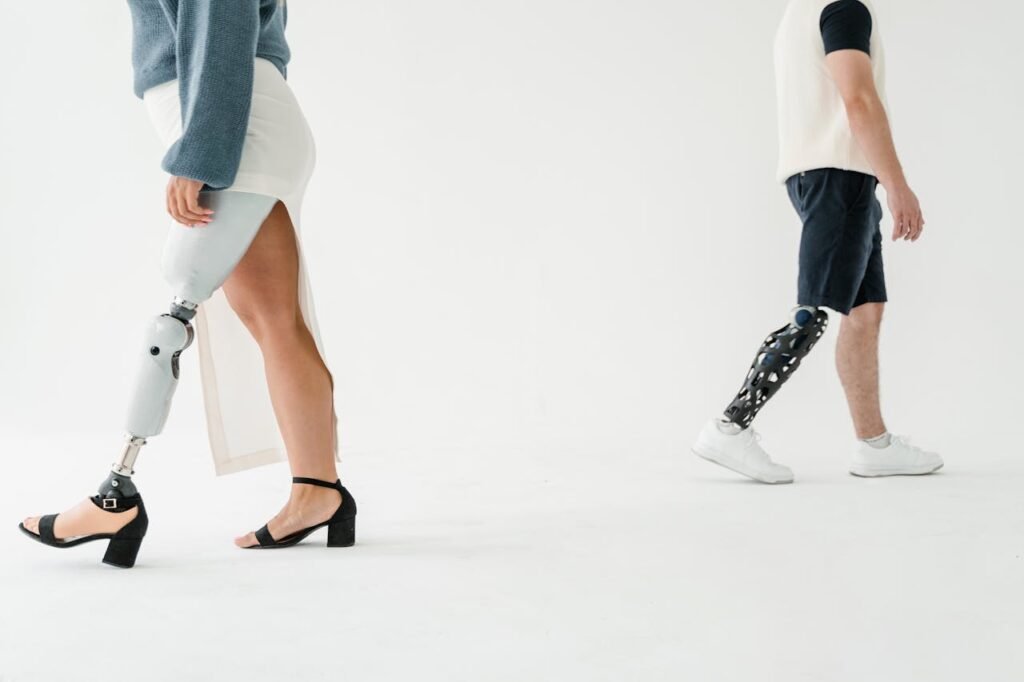
Debit card EMI is a newer option that has become popular in India in recent years. Unlike credit cards, which work on borrowed money, debit card EMIs are linked directly to your bank account.
When you choose this option, the bank approves you for an EMI plan based on your account history. Once approved, your prosthetic purchase is split into monthly installments that are auto-debited from your savings account.
Why Debit Card EMI Feels Safer
For many families, debit card EMI feels safer than credit card EMI. Since it is linked to your bank account, you only spend what the bank approves. It reduces the risk of overspending and debt spiraling out of control.
There is also comfort in knowing that the EMI comes directly from your own funds, rather than borrowed money. This psychological difference matters for many people who are cautious about credit.
The Costs You Should Know
Debit card EMI often comes with lower interest rates compared to credit card EMI. Some banks even run no-cost EMI offers, where the interest is absorbed by the seller or manufacturer.
However, eligibility can be tricky. Not everyone with a debit card automatically qualifies. Banks usually check your account balance history, salary credits, and spending patterns before approving you.
Example of Debit Card EMI
Suppose you buy a prosthetic for ₹2.5 lakh with a 24-month debit card EMI at 12% interest. Your monthly installment may be around ₹11,800. By the end of the tenure, you pay close to ₹2.83 lakh.
This is cheaper than a credit card EMI at 15%, but still more than the base price. If you get a no-cost debit card EMI offer, your total remains exactly ₹2.5 lakh.
Pros of Debit Card EMI
The key benefit is control. Since payments are linked to your bank account, you are less likely to overspend. Interest rates are often lower, and sometimes there are no-cost offers.
It is also easier for families who don’t have or don’t want to use credit cards.
Cons of Debit Card EMI
The biggest limitation is eligibility. Not all banks offer this facility, and not all customers qualify. The approval process may feel less transparent than credit card EMI, which is available to almost every cardholder.
Another drawback is limited flexibility. Some debit card EMI offers only apply to certain products or partner merchants.
UPI Credit
What UPI Credit Means
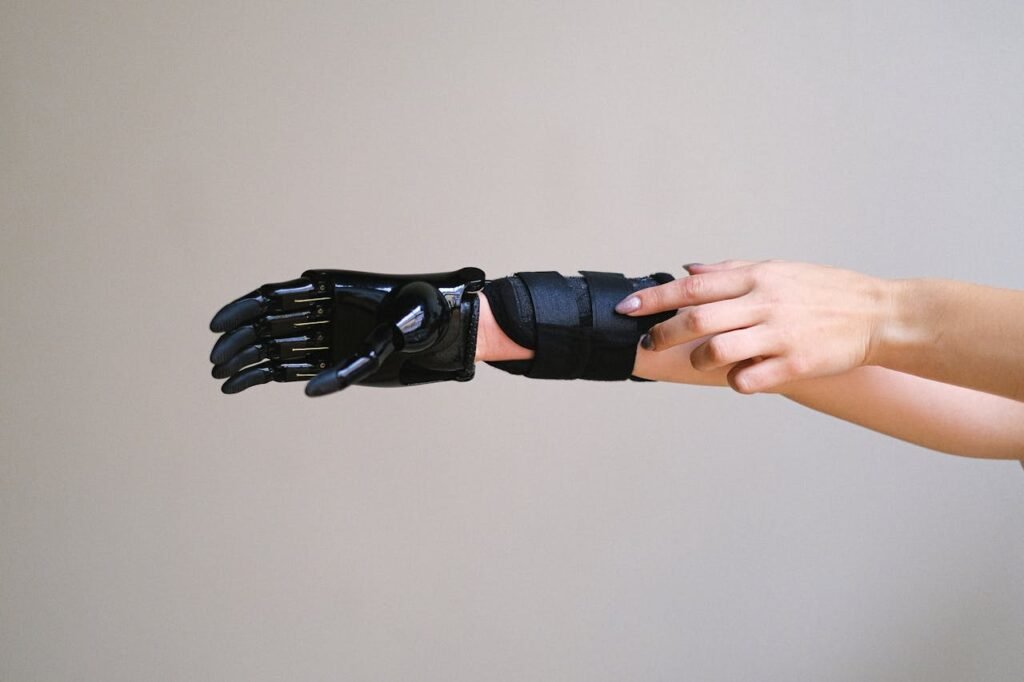
UPI credit is the newest option among the three. It allows you to use a line of credit directly through your UPI app, like PhonePe, Google Pay, or Paytm. Instead of money coming from your savings account, it comes from a pre-approved credit line given by your bank or card issuer.
In simple words, you can buy your prosthetic today using UPI credit and repay the amount later in installments, just like a credit card EMI.
Why UPI Credit Feels Modern
UPI is already the most popular way of making payments in India. Adding credit to it feels natural because people are already comfortable with scanning QR codes and sending money through UPI apps.
This makes UPI credit especially attractive to younger users and families who prefer digital-first options. It removes the formality of using a card while giving the same flexibility as EMI.
The Costs Involved
Just like credit card EMIs, UPI credit comes with interest. The rate depends on your bank or provider. Some offer no-cost EMI options on selected products, while others add 12–15% annual interest.
The difference is that repayment happens directly through your UPI-linked account, making the process simple and easy to track.
Example of UPI Credit EMI
Let’s say you buy a prosthetic worth ₹2.5 lakh using UPI credit. If you select a 12-month EMI plan at 12% interest, your monthly payment comes to around ₹22,200. By the end of 12 months, you will have paid about ₹2.66 lakh.
The cost is similar to a credit card EMI, but the experience of using UPI feels lighter and more accessible.
Pros of UPI Credit
The biggest advantage is convenience. You can scan and pay with UPI like you do every day, but instead of money leaving your account, it comes from a credit line.
It is also widely accepted. Almost every prosthetic provider, clinic, or medical equipment store now accepts UPI. This makes it flexible and easy to use anywhere.
Cons of UPI Credit
The main drawback is that it is still new. Not all banks have rolled it out fully, and not all families are comfortable with digital credit.
Interest rates can be similar to credit card EMIs, which means the total cost may rise quickly if you choose longer tenures. Families must be cautious not to overspend simply because UPI feels easy.
Comparing the Three Options
Convenience
Credit card EMI is highly convenient because approvals are instant, but it requires you to already have a card. Debit card EMI is more controlled but depends on bank approval. UPI credit is the easiest to use in daily life because it works directly on your phone.
For emergencies, credit card EMI and UPI credit are fastest. Debit card EMI may take some checking before activation.
Cost
In terms of cost, debit card EMI usually has the lowest interest rates. Credit card EMI and UPI credit often carry higher charges, sometimes up to 15–18%.
No-cost EMI is possible across all three, but it depends on the bank and seller partnership. Always check if such an offer is available before you choose.
Eligibility
Credit card EMI is the most widely available, since millions of Indians already use credit cards. Debit card EMI requires special approval and may not be available to everyone. UPI credit is expanding quickly, but it is still new and depends on whether your bank supports it.
Psychological Comfort
Families who do not like borrowing often feel safer with debit card EMI because it is tied to their bank account. Credit card EMI and UPI credit may feel riskier since they run on borrowed money.
But younger users often find UPI credit the most natural, since they are already used to UPI apps in daily life.
Real-Life Scenarios
A Family Choosing Credit Card EMI
In Delhi, a middle-class family needed a bionic prosthetic for their teenage son after an accident. They already had a credit card with a high limit. When the clinic offered them a credit card EMI option, it felt like the easiest way forward.
The approval happened instantly. They left the clinic that very day with the prosthetic fitted. The monthly EMI was a little higher because of the interest rate, but the speed mattered more than the extra cost. For this family, credit card EMI was about access without delay.
A Homemaker Opting for Debit Card EMI
In Chennai, a homemaker wanted a prosthetic to manage her daily household work independently. Her husband did not use a credit card, but the bank offered a debit card EMI option linked to his savings account.
The monthly payment was auto-deducted from their bank, which gave them a sense of control. They knew they could not overspend, because it depended on their balance. They felt safer with this choice, even though the eligibility process took longer.
A Young Professional Using UPI Credit
In Bengaluru, a young IT worker preferred to use UPI credit. He already used UPI apps for almost everything—groceries, bills, travel bookings. When his bank extended a credit line through UPI, it felt natural to him.
He purchased his prosthetic by scanning a QR code, just as he would buy lunch. The EMI was similar to a credit card, but he loved the simplicity of managing everything from his phone. For him, digital comfort was more important than the interest rate.
Long-Term Impact on Savings and Stress
Credit Card EMI in the Long Run
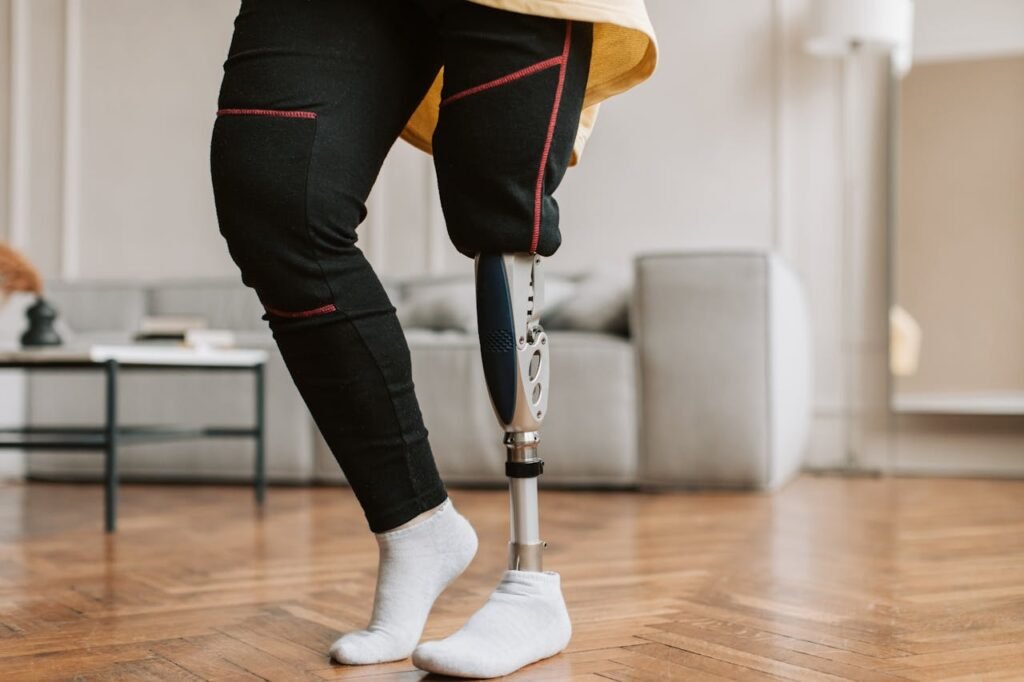
The main risk of credit card EMI is the interest load. Over two or three years, even a small monthly difference adds up to tens of thousands. Families often do not notice this because they are focused on monthly payments, not totals.
Another long-term effect is the habit of using credit cards for big expenses. If not managed carefully, this can lead to over-borrowing. However, families with discipline can benefit by building a strong credit history and improving their score for future needs.
Debit Card EMI in the Long Run
Debit card EMI keeps borrowing limited. Since it is linked to your bank account, you can only spend what the bank approves. This reduces the risk of falling into debt traps.
Over time, this method helps families maintain financial discipline. The downside is that debit card EMI is not always available for longer tenures or higher amounts. If the prosthetic cost is very high, approval might be difficult.
UPI Credit in the Long Run
UPI credit is still new, so its long-term impact is less studied. But one thing is clear—it makes borrowing feel easier. Because UPI payments are so quick, people may spend more without realizing it.
For prosthetic users, this ease can be positive because it removes barriers to access. But if used casually for other expenses, it can lead to financial stress later. Families must be careful to use UPI credit only for essentials, not impulse spending.
Hidden Factors Families Often Miss
Impact on Credit Score
Credit card EMI and UPI credit both affect your credit score. Paying on time builds your score, but missing payments hurts it. A strong score helps with future loans, while a weak one creates barriers.
Debit card EMI usually does not impact your credit score in the same way, since it is tied to your bank account. For families who want to avoid the pressure of credit ratings, this may feel safer.
Processing and Prepayment Charges
Many families focus on the EMI itself but forget about extra charges. Some banks charge processing fees when you convert a purchase into EMI. Others add penalties if you try to pay off the loan early.
Even a small percentage can add up when the device costs lakhs. Always ask for a written breakdown before agreeing.
Availability of No-Cost Offers
Some prosthetic providers partner with banks to offer no-cost EMI, where the interest is absorbed by the seller. This option saves families a lot over time, but it is not always available. Families should ask directly whether such an offer exists.
Emotional Comfort
Beyond numbers, there is also an emotional factor. Some people feel uneasy about borrowing on credit cards. Others feel more comfortable when payments are auto-deducted from their savings account. Younger users may trust UPI apps more than banks.
The right choice is not only about money but also about peace of mind.
Success Stories That Show the Choices in Action
A Student in Lucknow Choosing Credit Card EMI
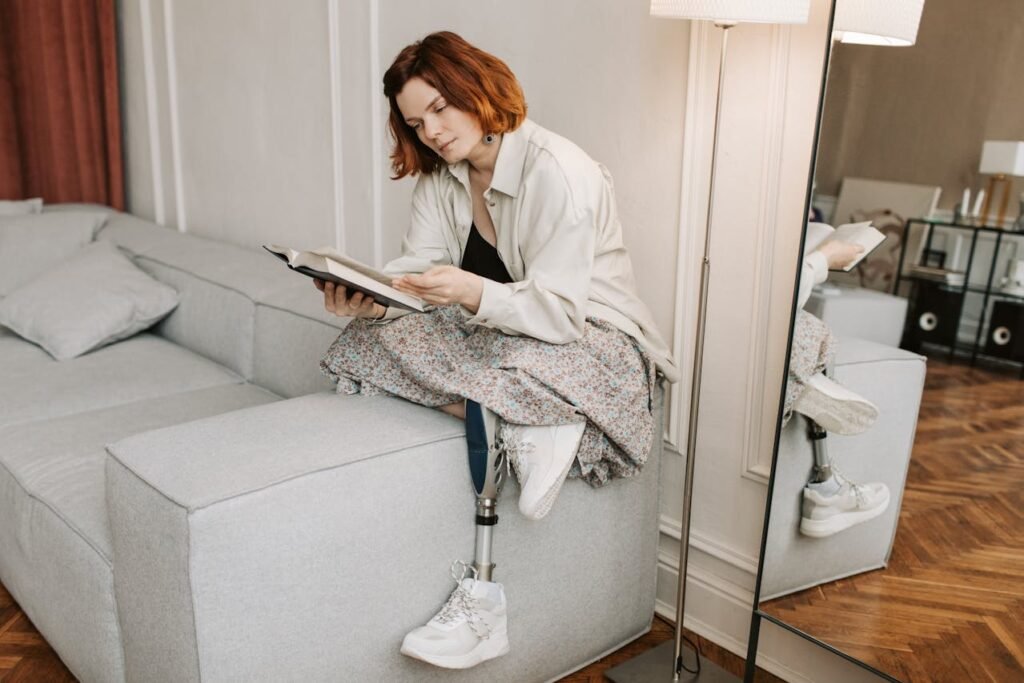
A 20-year-old student in Lucknow lost his hand in an accident. His parents wanted him to have the best prosthetic so he could continue his studies. They chose credit card EMI because it gave instant approval and quick access to the device.
The payments were higher because of interest, but they valued the speed. The student could return to his college within weeks, not months. For this family, time mattered more than cost.
A Farmer in Coimbatore Using Debit Card EMI
A farmer in Coimbatore wanted a prosthetic to work in his fields again. His family had no credit cards and lived mostly on savings. The bank offered him a debit card EMI with a 24-month tenure.
The monthly installment fit within his income, and the money was auto-deducted from his account. He felt safe knowing he was not borrowing beyond his means. This choice gave him financial discipline and emotional comfort.
A Young Entrepreneur in Bengaluru Trusting UPI Credit
A small business owner in Bengaluru was already comfortable using UPI for all his transactions. When he needed a prosthetic, he used UPI credit because it felt natural. He simply scanned a QR code and selected an EMI plan on his phone.
The payments were similar to a credit card EMI, but the digital process was faster and easier. For him, convenience and control on his phone were worth the extra cost.
Tactical Advice for Families
Match the EMI to Your Monthly Capacity
Do not just look at the interest rate. Ask yourself: what can we comfortably pay every month without stress? If the number feels too tight, choose a longer tenure even if it means paying more overall. Peace of mind is worth it.
Use EMI Calculators Before Deciding
Always check the total repayment. Enter different tenures and interest rates into an EMI calculator. A plan that looks cheap monthly may be costly over two or three years.
Ask About No-Cost Offers
Sometimes banks or prosthetic providers absorb the interest. This means you only pay the actual price, spread over time. Always ask if this option is available. It can save you thousands.
Keep Your Future in Mind
A prosthetic today is not forever. Technology keeps improving. If you finish paying faster, you will be free to upgrade sooner. Shorter EMI plans may cost more monthly but give you flexibility later.
Involve Your Family
Do not make the choice alone. Talk to your spouse, children, or parents. Often, families are ready to adjust small expenses for independence and dignity. Honest conversations prevent stress later.
Choosing What Works Best
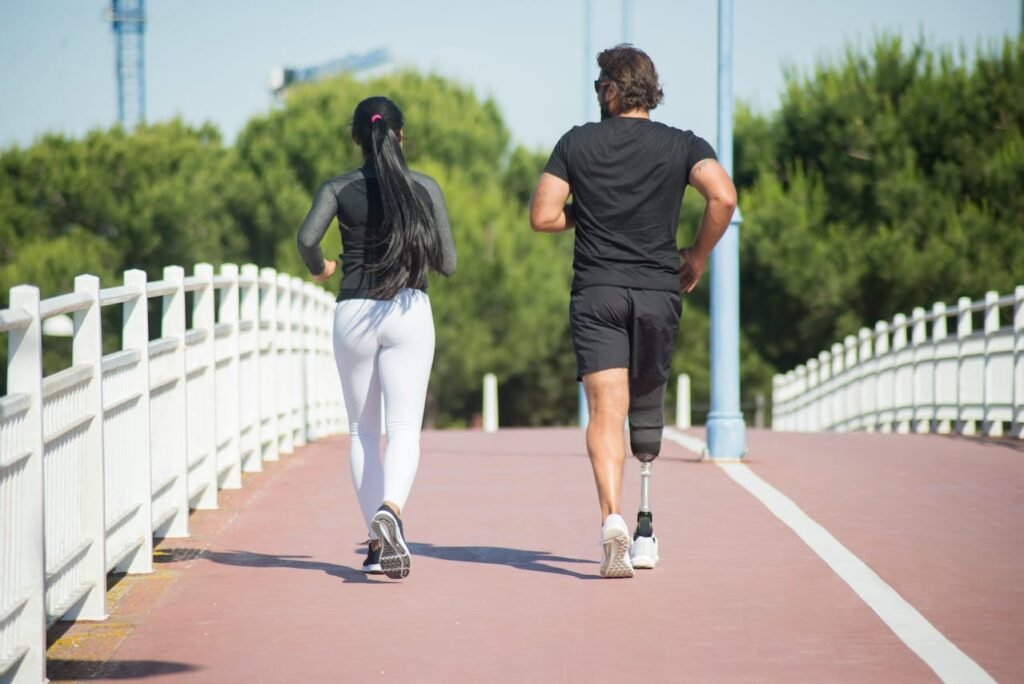
Credit card EMI is best if you need speed and instant approval. Debit card EMI works well for those who prefer discipline and want to avoid heavy borrowing. UPI credit is perfect for those who value convenience and are already comfortable with digital apps.
There is no one-size-fits-all answer. The right choice depends on your income, your comfort with credit, and your family’s priorities. The real goal is not to find the cheapest option but to find the option that lets you live freely without financial fear.
Why Robobionics Stands With You
At Robobionics, we know that cost is one of the biggest barriers to getting a prosthetic. That is why we work hard to make payment options simple, fair, and accessible.
We partner with finance providers to offer credit card EMI, debit card EMI, and UPI credit choices. We guide you through the differences and help you see the total cost before you commit. Our goal is transparency, not confusion.
Most importantly, we keep our pricing consistent across India. The Grippy Bionic Hand costs between ₹2.15–3 lakh, whether you are in Mumbai, Delhi, Bengaluru, or Chennai. With EMI options, this becomes a monthly number you can manage.
A Call to Begin Your Journey
Do not let financial worries hold you back from living fully. With EMI options—credit card, debit card, or UPI—you have the power to choose what works best for your family.
Take the first step by booking a demo with us. You will not only see and try the prosthetic but also learn exactly how your payments will look each month. We will guide you through the numbers with honesty and care.
Book your demo today at: https://www.robobionics.in/bookdemo/
Your story of freedom, confidence, and dignity begins with one decision. Whether you choose credit card EMI, debit card EMI, or UPI credit, Robobionics will walk with you every step of the way.



